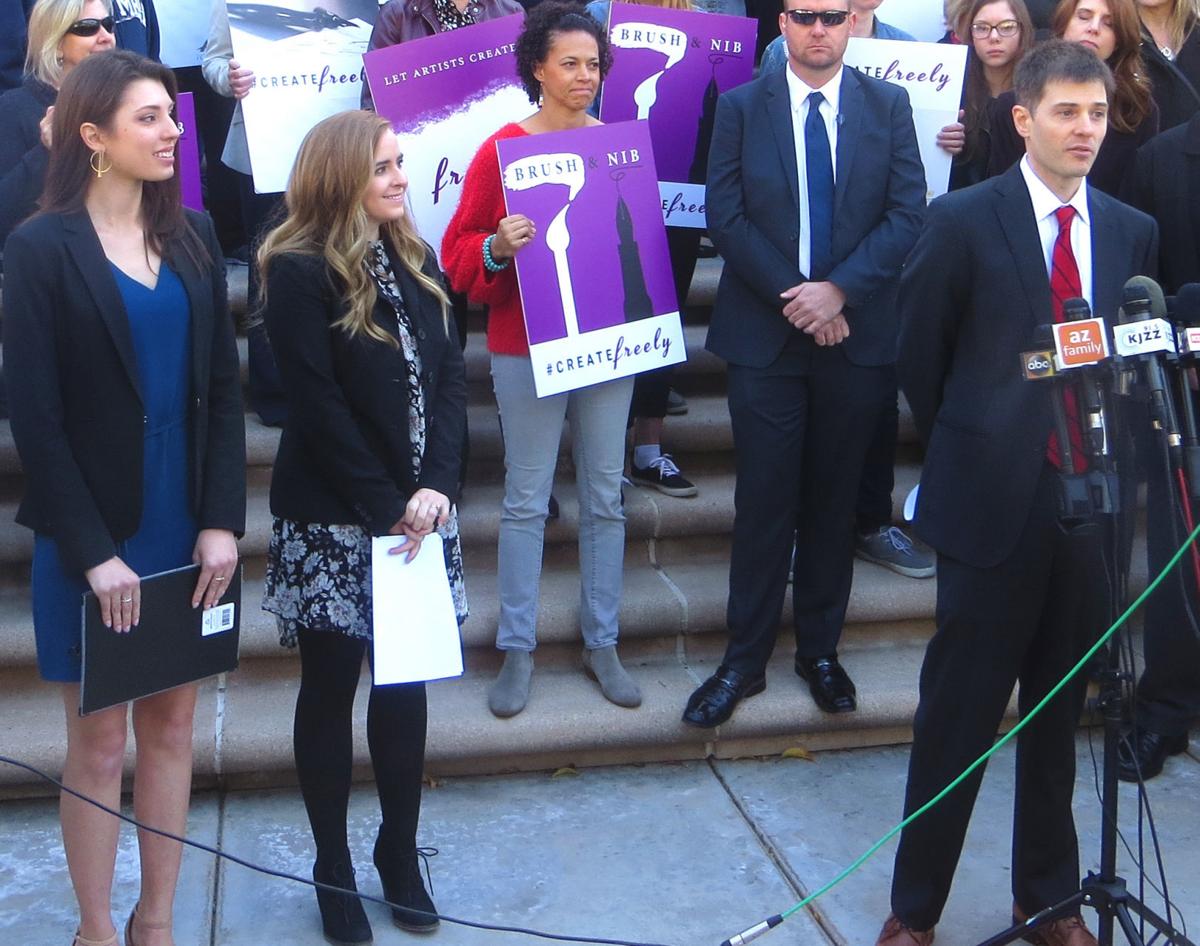PHOENIX т The legal question of if and when businesses can refuse to provide services to same-sex couples could come down to how the УлшжжБВЅ Supreme Court defines тcelebratory language.т
Attorney Jonathan Scruggs, who represents the owners of Brush & Nib Studio, said his clients do provide off-the-shelf items for weddings, such as generic invitations, place cards and table numbers. And he told the justices on Tuesday that the businessesт two owners, who do calligraphy, also would not turn away gay clients who want them to design something else, even down to invitations to a memorial for a same-sex spouse.
What they will not do, said Scruggs, is create anything that he said celebrates the wedding of a same-sex couple. That, he said, runs contrary to their religious beliefs that marriage is solely between one man and one woman.
That eliminates all same-sex wedding invitations, he said.
People are also reading…
тAll wedding invitations the studio creates contain celebratory text about the wedding,т he said. тAnd that is enough for this court to say, тYou canтt compel that message.тт
But Eric Fraser, an assistant Phoenix city attorney, argued that Joanna Duka and Breanna Koski, the owners of the studio, are not being asked to celebrate anyoneтs wedding.
He said they are in the business of designing wedding invitations and similar items. And he said the Phoenix anti-discrimination ordinance they are challenging simply says if you provide a service to the public, you canтt refuse that service to someone based solely on sexual orientation.
тOnce Brush & Nib has decided to offer a particular type of invitation to the general public, the one thing it canтt do is when somebody calls making the request, they canтt have the sole test of whether theyтre going to make the invitation be, тWhat sex is your spouse?т or тWhat sex is your fiancУЉ?тт Fraser told the court.
тAnd if thatтs the one thing they need to know before they decide whether to make the invitation or not, then itтs not about the message,т he continued. тThatтs about who the person is.т
The Phoenix ordinance makes it a crime to discriminate based on race, gender, religion or sexual orientation.
Duka and Koski want a declaration that they canтt be punished for refusing to make certain products for same-sex couples.
At the hearing Tuesday, several of the justices questioned Scruggsт contention that the women were being forced to convey a message that runs contrary to their religious beliefs.
Chief Justice Scott Bales asked whatтs the difference in designing a wedding invitation for Pat and Terry if it turns out that both are of the same sex. Bales wanted Scruggs to explain why it would be OK for the studio owners to turn the gay couple away, given that the invitations and other products would be identical, regardless of the gender of the two people who want to buy the items.
тItтs the context,т said Scruggs. тItтs the message thatтs conveyed in that particular context.т
Justice Andrew Gould indicated he was troubled by the idea that the Phoenix anti-discrimination ordinance was effectively forcing Duka and Koski to say something that runs contrary to their religious beliefs.
тCertainly an individual has the autonomy over the words that they write and the pictures that they paint,т Gould said. And in this case, he said, the invitation asks someone to go to a same-sex wedding.
тThat is a ceremony that Brush & Nib objects to,т Gould said. тThey very fact of creating words тyou are invited to this ceremonyт that I object to, arenтt you compelling them ... to invite somebody to a ceremony that they strongly object to?т
But Fraser said that presumes the invitation is somehow different for a same-sex wedding than for a heterosexual couple.
тIn all other senses, other than the names, the invitation, the words that theyтre writing are identical,т he said.
Fraser did say that nothing in the ordinance prohibits the business owners from publicly announcing т and posting in their shop т that they are opposed to same-sex marriages. He even told Gould that they could put up derogatory statements about same-sex couples.
What they cannot announce, Fraser said, is that they will not provide services to gays, or that gay customers will be treated differently.
Justice Clint Bolick questioned how far a personтs religious beliefs could allow them to refuse to serve customers.
тWhat if it was an interracial marriage and you had calligraphers who sincerely believed that interracial marriage was a sin?т he asked.
тThat would be entirely different,т Scruggs said. And if there were such a case, he said, тthe court would have to consider it when it comes.т
Bolick also expressed concern that a violation of the ordinance is punishable by a fine of up to $2,500 a day plus up to six months in jail. He said that kind of penalty could have a тchilling effectт on the ability of business owners to exercise their free-speech rights.
Fraser said no one has ever gone to jail for violating the ordinance. And he told Bolick that the size of the penalty is legally irrelevant to whether the ordinance is legal and enforceable.
Any ruling on the legality of the Phoenix ordinance would affect similar ordinances in УлшжжБВЅ, Tempe and Flagstaff.
The justices gave no indication when they will rule.





















